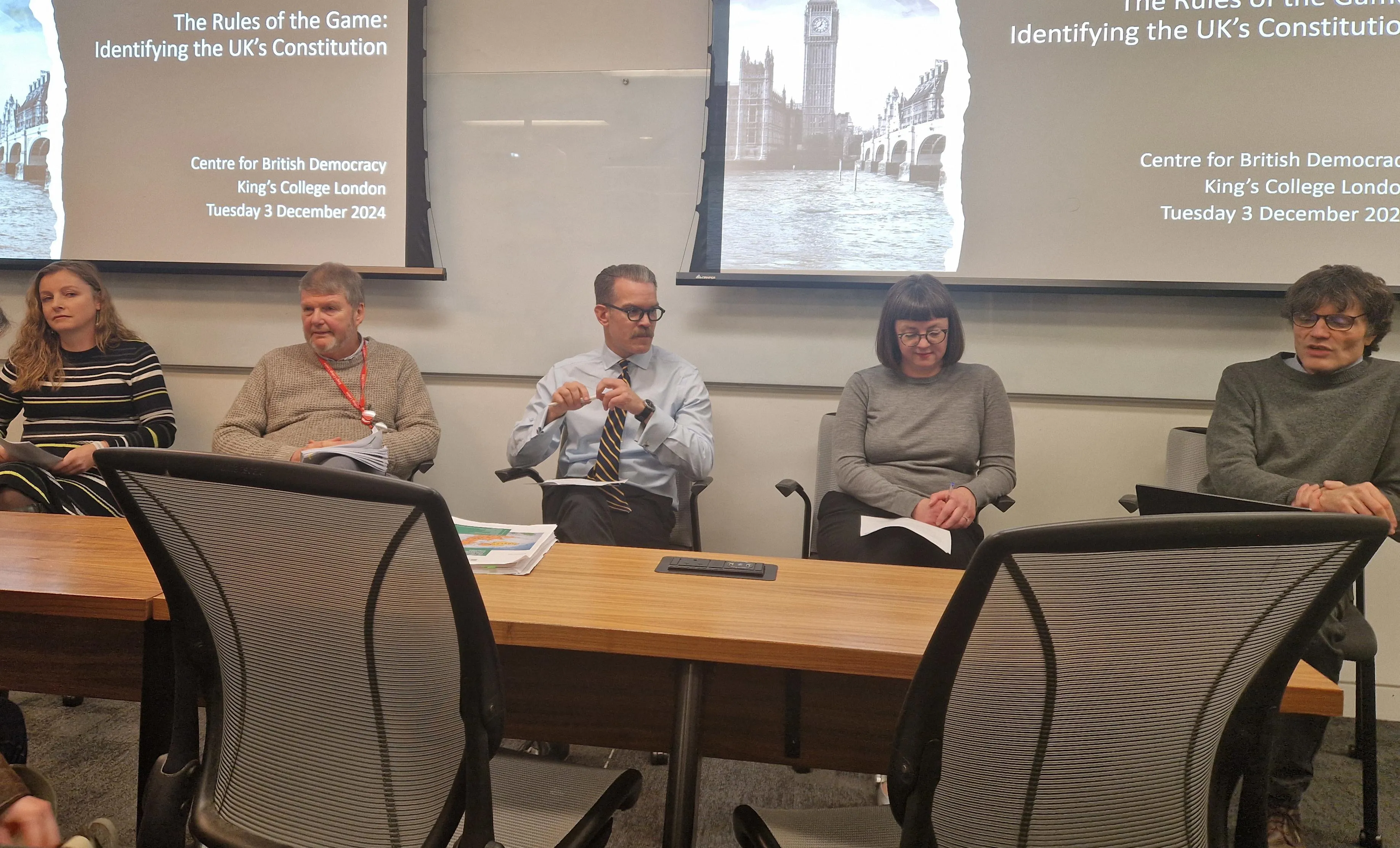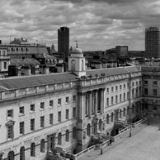19 December 2024
UK constitution in focus at panel event
Ahoo Bayat
The UK’s complex constitution was in focus at an event hosted by the Centre for British Democracy.

Dr David Torrance, constitution specialist at the House of the Commons Library, presented a new report which draws on his research into the various laws, conventions and rules which make up the UK constitution. Unlike many other countries, the UK does not bring the main rules of the polity into a single document with special status. However, most of the key principles and procedures are written down somewhere. In his report, The United Kingdom constitution – a mapping exercise, he summarises the main statutes, prerogatives, conventions and case law as they apply today.
Dr Torrance was joined by panellists Dr Carmen Pavel of the Department of Political Economy (DPE) at King’s, Dr Elin Weston of the King’s Law School, and Simon James from the Cabinet Office.
The 90-minute discussion commenced with an introductory presentation of Dr Torrance’s report, outlining the rationale behind its creation. Following this, each panellist provided thoughtful insights and comments in response to the report.
Dr Torrance's investigations showed that, while most laws and procedures are recorded, they are frequently scattered and hard to find. While the lack of a codified constitution is distinctive, it is not unique, with New Zealand providing another example.
Dr Torrance pointed out that initiatives such as the Cabinet Manual, have aimed to provide clarity, although such documents do not carry legal weight.
His research highlights the importance of comprehending the current state of the UK's constitution, especially its "territorial constitution," which shapes the functioning of devolved administrations. Dr Torrance emphasised how perceptions of the UK constitution vary from the viewpoints of Wales, Scotland, and Northern Ireland, reflecting its fragmented and intricate character.
When discussing why the constitution remains dispersed, Dr Torrance said it stemmed from the historical evolution of the UK. The constitution developed slowly over time, lacking a single defining event—a "big bang moment"—that would lead to establishing a single codified constitution.
Dr Torrance mentioned that pinpointing such a moment was challenging since the UK's political and legal systems had traditionally favoured gradual adjustments rather than extensive reforms. This slow accumulation of constitutional components led to the fragmented nature of the existing framework.
As an expert on the philosophy of international law, Dr Pavel examined constitution making as an evolving process that is always open to amendments and adjustments. Pavel raised essential questions: Is the constitutional framework of the UK a comprehensive document detailing all operational laws, or is it a set of legal rules which target some fundamental functions that the political and legal institutions ought to serve? What is the ultimate aim of a constitution in the UK, and how might it develop in the future? She highlighted the essential purposes of a constitution—protecting democratic elections, ensuring an independent judiciary and limits on executive power, safeguarding human rights, and maintaining the rule of law. This prompted her to remark upon an imbalance in the UK constitution, reflected in the report, where much more space is given, for example, to local government than to human rights. Her exploration led her to ask what constitutes the fundamental principles and arguments that animate the constitution and whether its framework truly reflects the values it professes to champion.

Dr Weston, who specialises in constitutional law, held that Dr Torrance’s publication showed that it would be possible to fully codify the UK's constitution, thereby challenging the deeply entrenched belief that this is unachievable. At the same time, the report also points to notable uncertainties within the constitutional system. A significant concern is the monarch's role as the head of state. Although the monarch possesses substantial constitutional authority—such as appointing a prime minister and dissolving parliament—these actions are typically carried out at the prime minister's request. However, Dr Weston noted that a lawyer might query what defines "normal" in these situations. For example, are there circumstances in which a monarch might deny a prime minister a dissolution of parliament?
Another area of uncertainty pertains to the constitution’s origins and extent. Dr Weston observed that room for doubt had developed about how the judiciary might interpret and apply the doctrine of parliamentary sovereignty. Additionally, she expressed concern about the dependence on those in power to act with integrity to uphold constitutional values. Traditionally, this responsibility has rested with individuals expected to comply with the rules and serve the public interest. However, as Dr Weston warned, the system's dependence on personal integrity introduces uncertainty—what occurs if they fail to do so?
Simon James, speaking in a personal capacity, provided a practical viewpoint on the report, emphasising its value. James elaborated on various subjects, including the function of the Privy Council and the characteristics of inter-governmental relations, areas that deserve further investigation. James considered further subjects, such as ministerial accountability to parliament and public, and judicial review. But most of all, he expressed the hope that the report be regularly updated.
The event took place at King’s on 3 December. To find out more about the Centre for British Democracy, visit: Centre for British Democracy.



